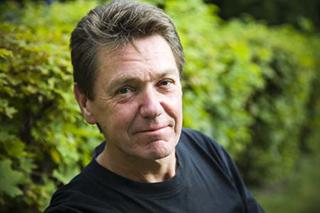Isn’t it strange how national talent goes by subject? Put on a blockbuster exhibition of Dutch painting and the queue will stretch to the Embankment. But can you imagine a festival of Dutch music? Sweelinck (d 1652) and Andriessen (b 1939) more or less sums it up. The BBC brought together three living Dutch composers for this Portrait concert, and one of them wasn’t after all Dutch (“I’ve kept my Swedish passport,” he insisted rather unchivalrously in the pre-concert interview). And I’m sorry to report – as a lifelong fan of Speculaas biscuits and Dutch gin – that the Swedish work was the best.
“Fifty years ago,” the programme announced, “music in Holland was a sober and conservative affair.” Help! Sober Dutch music. But we move on. Even I can remember the batty goings-on at Holland Festivals in the Sixties, when Andriessen and Peter Schat’s most striking contribution was an anti-capitalist Don Juan opera by the name of Reconstructie, in which the Don’s victims were girls called Bolivia and Cuba, the Commendatore was renamed Che, and the proceeds from the record sale went to the Committee for Solidarity with Cuba.
Being in the audience is sometimes like sitting in a doctor’s waiting room
Yet the sad thing about non-sober Dutch music was that it was even less exciting than the sober sort. Andriessen, in his amiably progressive way, has since become respectable and (therefore?) interesting. And the two Dutch passport holders in the Cardiff concert, Robin de Raaf and Willem Jeths, turned out to be neither sober nor obviously pickled, but good solid branches from the tree of modern European music, students of such as George Benjamin and Julian Anderson, devotees of Boulez and Ligeti. The essential Dutch character of Jeths’s Second Violin Concerto, the programme note explained, “lies in an implacable logic and comprehensibility”. Not exactly folksong, but not clogs and windmills either, and certainly not cash for Castro; more like the International Society for Contemporary Music, music’s equivalent of the IMF.
Both works had their good points but neither of them gripped the mind or the soul from start to finish, pace the programme. De Raaf’s Der einsame im Herbst for chamber orchestra quotes Mahler in its title, but the comparison is risky, not on grounds of coherence, but in terms of atmosphere and emotion. De Raaf’s “lone figure” is Schoenberg, who outlived his own musical “children”, Berg and Webern, by several years. But it’s hard to see the poignancy in this. And without poignancy, the music betrays the title.
So what’s left? Some striking spaced-out scoring, for high and low wind, Ligetian polytextures, a lot of refined orchestral detail in the Webernian finale, some intriguing, not quite realised antiphonies between a pair of pianos and a pair of horns, but withal precious little genuine movement once you took your eyes off the conductor, Jac van Steen, whose relentless crotchet pulse (at 60 rather than the composer’s 40) was visible but not audible.
Jeths’s Violin Concerto, played with apparent conviction by Tasmin Little (for whom it was written), is if anything even less mobile. For eight or 10 minutes it hangs fire almost completely, with fragmentary violin figures, not much line, but a tendency to get stuck on particular notes or chords. Then comes a solo cadenza, somewhat subdued in character, after which the orchestral sound warms up perceptibly and a strain of lyricism peeps out. But the whole effect is desultory and lacks impulse. Jeths says he envisages the orchestra as a kind of mirror of the violin, picking up its mood and colour and (I suppose) bouncing them back. But this was undermined by problems of balance, the solo violin sounding weak and not everything in the large orchestra sounding at all.
The third piece, also for large orchestra, was Klas Torstensson’s Fastlandet, a noisy, evocative, sometimes messy tribute to Sibelius, who was almost a compatriot of Torstensson’s, being a linguistically and culturally Swedish Finn. Where the Dutch pieces stagnated, Fastlandet leaps into action with a thunderous timpani solo, and only dies down in a rather inconsequential middle section made up of indistinct rustlings and snapping twigs. Then it broods at some length on the opening cor anglais figure of Sibelius’s Swan of Tuonela, one of those obsessive slow ascents to a loud climax that Sibelius made his own.
There are other hints of the master: a scale here, a loud major chord there, all mixed up with excitable skirlings of Torstensson’s own. I enjoyed it rather as one enjoys a day at the races. The title means "Mainland", but when pressed, Torstensson was not very clear why: not Sweden, not Holland (definitely not), not landscape. Perhaps the start of a triptych ending in heaven, which still leaves quite a long way to go.
The BBC National Orchestra of Wales seemed in fine form as ever, and Jac van Steen controlled matters in a suitably business-like fashion. These are enterprising concerts, though being in the audience is sometimes like sitting in a doctor’s waiting room. For less than an hour of music you hang around for a couple of hours, eked out by the announcer (in this case Piers Burton Page) asking the composers questions the answers to which are in the programme, while the orchestra drifts on and off and the platform is rearranged. BBC Invitation Concerts go west: but you have to pay.
- Holland Panorama will be broadcast on Radio 3's Hear and Now, not yet scheduled














Add comment